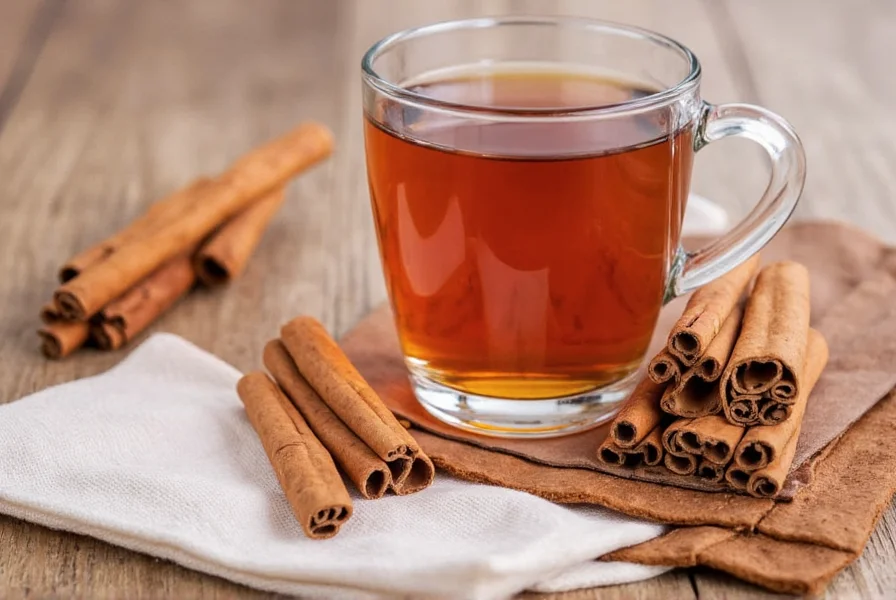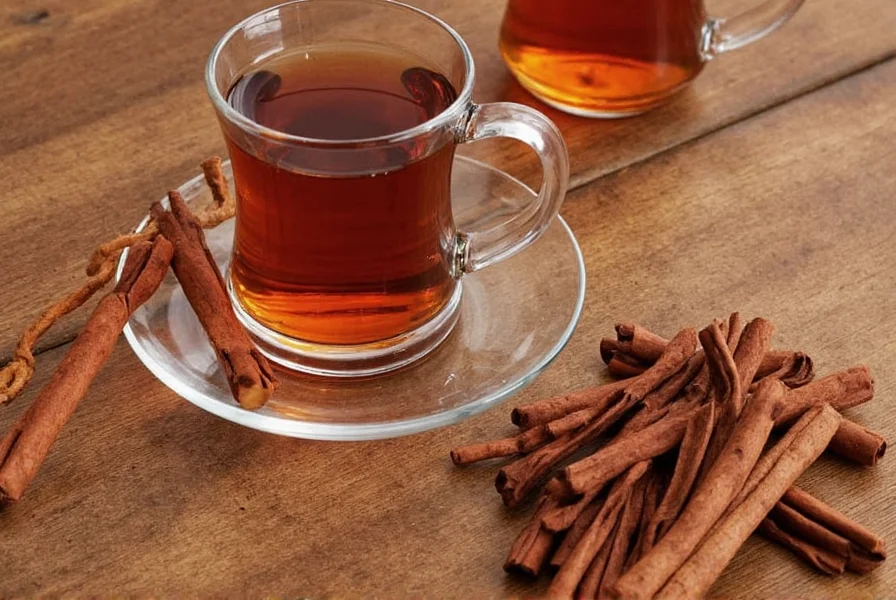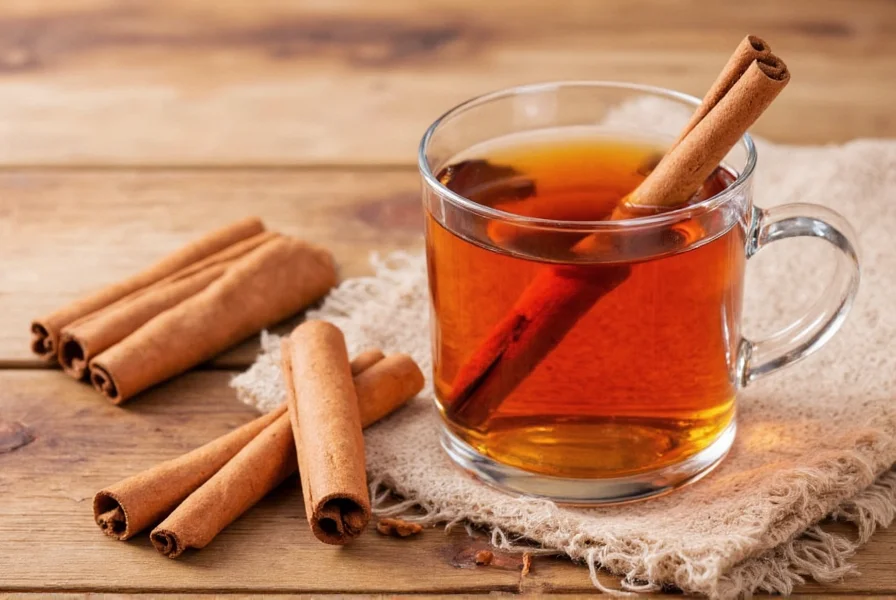Cinnamon tea has gained popularity as a health-promoting herbal beverage with roots in traditional medicine practices across Asia and the Middle East. Unlike true teas from the Camellia sinensis plant, cinnamon tea qualifies as a tisane or herbal infusion, making it naturally caffeine-free and suitable for consumption throughout the day. The distinctive flavor comes from cinnamaldehyde, the compound responsible for cinnamon's characteristic aroma and many of its potential health properties.
Understanding Cinnamon Tea Composition
Cinnamon tea primarily contains bioactive compounds including cinnamaldehyde (60-90%), eugenol, and linalool. These components contribute to its potential health effects. Two main varieties exist in commercial production:
| Cinnamon Type | Source | Key Characteristics | Coumarin Content |
|---|---|---|---|
| Ceylon Cinnamon | Cinnamomum verum | Sweeter, more delicate flavor | Low (0.004-0.13%) |
| Cassia Cinnamon | Cinnamomum cassia | Stronger, spicier flavor | High (2.15-6.97%) |
For regular consumption, Ceylon cinnamon represents the safer option due to significantly lower coumarin levels. Coumarin, while contributing to cinnamon's flavor, may cause liver toxicity in excessive amounts.

Evidence-Based Health Benefits
Research indicates several potential health benefits associated with regular cinnamon tea consumption:
Blood Sugar Regulation
Multiple studies suggest cinnamon may improve insulin sensitivity. A 2016 meta-analysis published in the Journal of Ethnic Foods concluded that cinnamon supplementation significantly reduced fasting blood glucose levels. While tea preparation yields lower concentrations than supplements, regular consumption may contribute to metabolic health. The mechanism appears related to cinnamon's ability to mimic insulin and enhance glucose uptake by cells.
Antioxidant Properties
Cinnamon ranks among the most antioxidant-rich spices. Research in Oxidative Medicine and Cellular Longevity identified cinnamon as having the fourth highest antioxidant capacity among 26 spices tested. These antioxidants combat oxidative stress, potentially reducing cellular damage associated with chronic diseases. The polyphenols in cinnamon tea remain bioavailable even after brewing.
Anti-Inflammatory Effects
Chronic inflammation contributes to numerous health conditions. Cinnamaldehyde demonstrates anti-inflammatory properties by inhibiting inflammatory signaling pathways, according to research in Molecular Nutrition & Food Research. While tea contains lower concentrations than pure extracts, regular consumption may contribute to systemic inflammation reduction.
Practical Preparation Methods
Maximizing the health benefits of cinnamon tea requires proper preparation:
Traditional Cinnamon Stick Method
Using whole cinnamon sticks preserves more volatile compounds than powder. For optimal extraction:
- Use 1-2 inches of Ceylon cinnamon stick per 8 ounces of water
- Bring water to boil, then add cinnamon
- Simmer covered for 10-15 minutes
- Strain and enjoy plain or with lemon
Cold Brew Alternative
Cold brewing preserves heat-sensitive compounds. Combine cinnamon sticks with cold water and refrigerate for 8-12 hours. This method produces a smoother flavor with potentially higher retention of certain bioactive compounds.

Potential Considerations and Side Effects
While generally safe, cinnamon tea presents some considerations:
Coumarin Content Awareness
Cassia cinnamon contains higher coumarin levels that may affect liver health with prolonged excessive consumption. The European Food Safety Authority recommends a maximum daily coumarin intake of 0.1 mg per kilogram of body weight. For regular daily consumption, Ceylon cinnamon provides a safer alternative with significantly lower coumarin content.
Medication Interactions
Cinnamon may interact with certain medications, particularly those affecting blood sugar or liver metabolism. Individuals taking diabetes medications should monitor blood glucose levels closely when adding cinnamon tea to their routine, as the combined effect could potentially cause hypoglycemia.
Pregnancy Considerations
While moderate consumption of cinnamon tea appears safe during pregnancy, excessive intake may stimulate uterine contractions. Pregnant women should limit consumption to 1-2 cups daily and consult with their healthcare provider.
Realistic Expectations for Health Benefits
It's crucial to maintain realistic expectations about cinnamon tea's effects. While research shows promise for certain health markers, cinnamon tea alone won't produce dramatic health transformations. Consider it as part of a comprehensive approach to wellness rather than a standalone solution. The most significant benefits appear to come from consistent, moderate consumption as part of an overall healthy lifestyle.
Comparing Cinnamon Tea to Other Herbal Options
Unlike many herbal teas, cinnamon tea offers distinctive metabolic benefits. While chamomile promotes relaxation and peppermint aids digestion, cinnamon tea's primary distinction lies in its potential effects on glucose metabolism. When combined with complementary herbs like ginger or turmeric, cinnamon tea can create synergistic health-promoting blends targeting multiple physiological pathways.
Conclusion
Cinnamon tea represents a flavorful, caffeine-free beverage with promising health benefits supported by growing scientific evidence. Its potential effects on blood sugar regulation, antioxidant protection, and inflammation reduction make it a valuable addition to a health-conscious diet. By selecting Ceylon cinnamon, using proper brewing techniques, and maintaining realistic expectations about its effects, consumers can safely enjoy this ancient herbal remedy with modern scientific backing. As with any dietary change, consistency and moderation yield the best results.
Frequently Asked Questions
How much cinnamon tea should I drink daily for health benefits?
Research suggests 1-2 cups daily provides potential benefits without exceeding safe coumarin limits, especially when using Ceylon cinnamon. Consuming more than 4 cups daily of Cassia cinnamon tea may approach concerning coumarin levels for some individuals.
Can cinnamon tea help lower blood pressure?
Some animal studies suggest cinnamon may have blood pressure-lowering effects, but human evidence remains limited. A 2013 review in Nutrition Research noted modest reductions in blood pressure among diabetes patients taking cinnamon supplements, but tea preparation likely delivers lower concentrations. It shouldn't replace prescribed hypertension treatments.
When is the best time to drink cinnamon tea?
Morning consumption may support metabolic health throughout the day, while evening drinking could potentially aid overnight blood sugar regulation. Unlike caffeinated teas, cinnamon tea won't interfere with sleep, making it suitable for any time of day based on personal preference and health goals.
Does adding honey to cinnamon tea negate its health benefits?
While honey adds natural sugars, moderate amounts (½-1 teaspoon) likely don't negate cinnamon's benefits for most people. However, those managing diabetes or blood sugar should be cautious, as the combination increases the beverage's glycemic impact. For maximum metabolic benefit, enjoy cinnamon tea plain or with lemon.
How long does it take to notice benefits from drinking cinnamon tea regularly?
Most studies showing measurable effects used cinnamon supplementation for 4-12 weeks. With tea's lower concentration, consistent daily consumption for at least 6-8 weeks may be needed to potentially notice benefits for blood sugar regulation or inflammation markers. Individual responses vary based on overall health and lifestyle factors.











 浙公网安备
33010002000092号
浙公网安备
33010002000092号 浙B2-20120091-4
浙B2-20120091-4